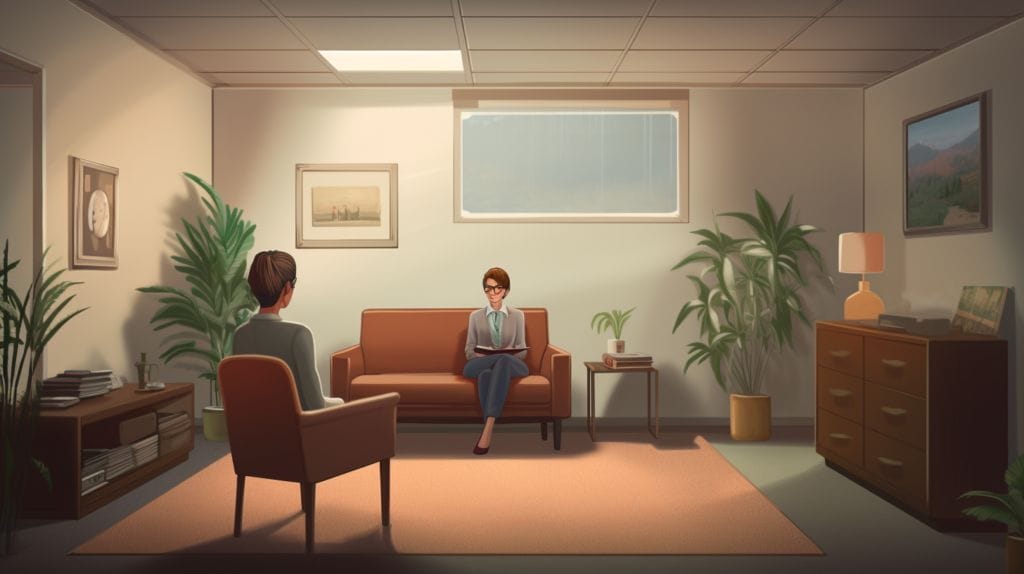Greetings everyone! I have triumphed over my anxiety-induced habit of consistently licking my lips. Are you curious about how to overcome the stress associated with lip-licking too? Let’s unpack this!
I’ve gathered valuable tips, techniques, and product recommendations to help you overcome this challenge.
I’ll also let you know when to seek professional help.
So, if you’re tired of chapped lips and awkward stares, let’s dive into my guide on how to quit licking your lips due to anxiety.
Key Takeaways
- Understanding the psychological connection between anxiety and lip licking is crucial in overcoming the habit.
- Identifying triggers, such as social interactions or stressful events, can help develop coping strategies.
- It can lead to physical consequences like lip dermatitis and eczema. Hence, stopping the habit is necessary to prevent further damage.
- Implementing psychological techniques like cognitive-behavioral strategies, self-soothing techniques, and developing new habits can help control anxiety and curb lip licking.
Understanding Anxiety-Driven Lip Licking

Let’s begin by exploring the psychological link between anxiety and the habit of lip-licking.
We’ll then identify some common triggers that tend to prompt this behavior.
Lastly, we’ll highlight the physical repercussions, such as lip dermatitis and eczema.
The Psychological Connection Between Anxiety and Lip-licking
I’m going to delve into the mind’s intricate link between anxiety and the habit of licking.
It’s a common habit that many of us unconsciously adopt, often as a sign of stress. When anxiety kicks in, it triggers a flight-or-fight response, which may make you lick your lips more frequently. It is because, under stress, your body produces more cortisol, leading to a dry mouth and prompting you to moisten your lips.
Understanding this connection is a significant step in getting a handle on anxiety-driven lip licking. Once you’re aware of the psychological roots of your need to lick your lips, you can start working on strategies to stop licking your lips. After all, awareness is the first step towards change!
Common Triggers for Lip-licking
In tackling the issue of anxiety-driven lip licking, it’s crucial first to identify the common triggers that can lead to this habit. These triggers, typically rooted in anxiety, can range from social situations to personal habits. Becoming aware of these triggers is a significant step towards mastering how to stop licking lips.
Here’s a quick table to illustrate some common triggers:
| Trigger | Description | Solution |
| Social Anxiety | Fear of social situations can make one nervous, leading to licking. | Practicing social skills exposure therapy. |
| Stress | High-pressure situations can lead to anxiety and consequent licking. | Stress management techniques, regular exercise. |
| Dry Lips | The discomfort of dry lips can cause licking, exacerbating the dryness. | Regular use of lip balm, staying hydrated. |
The Physical Consequences of Excessive Licking
Regrettably, I’ve observed that it can lead to physical consequences like lip dermatitis and eczema.
Also known as lip licker’s dermatitis, it is a condition where the skin on and around the lips becomes inflamed due to constant moisture. It’s painful, causing your lips to crack, flake, and even bleed.
Eczema, another result, is a skin condition that can cause itchiness, redness, and dryness. It’s not a pleasant experience and can be pretty distressing.
These physical consequences should serve as a wake-up call for anyone struggling to quit. Understanding the harm we could be causing to our bodies is crucial. In the quest for mastery, awareness and action are critical.
Psychological Techniques to Control Anxiety and Stop Lip Licking

Let’s move on to exploring some psychological techniques that can help manage anxiety and curb lip licking.
We’ll start by outlining cognitive-behavioral strategies.
Then, we’ll touch on the benefits of mindfulness and meditation.
Cognitive-behavioral Strategies for Managing Anxiety
I’m going to share some effective cognitive-behavioral strategies to help manage your anxiety and curb the habit of lip licking. These tips to help break the habit revolve around self-soothing and creating a new habit.
One of the primary ways to stop licking is to become aware of when you’re doing it. Once you’re aware, you can implement a self-soothing strategy, such as deep breathing or mindfulness meditation.
Another effective technique is to develop a new habit to replace the old one. It could be as simple as squeezing a stress ball or rubbing your fingers together.
The Role of Mindfulness and Meditation Techniques in Anxiety Control
Someone might wonder how mindfulness and meditation techniques can play a significant role in controlling anxiety and subsequently help to stop the habit of lip licking. Well, let me explain.
When you’re constantly feeling the urge to lick your lips, it’s often a sign of underlying anxiety. Mindfulness and meditation can aid in learning how to stop this. They help you stay present, focusing on the current rather than past or future worries.
This focus can interrupt the cycle of anxiety and the urge to lick. Gradually, you’ll notice the urge to lick your lips subsides. Consistent practice of these techniques can help you kick the habit of licking your lips.
The Concept of Habit Reversal Training
Often, I’ve found that habit reversal training can be an effective psychological technique to control anxiety and stop the habit of lip licking. This method involves increasing awareness of when and why you’re licking your lips. Find yourself licking your lips due to anxiety. The training will help you kick this habit by teaching you to substitute it with healthier behavior.
Licking your lips may seem harmless, but frequent licking can lead to dryness and chapping. One of the tips to stop this habit is to keep a record of when you’re doing it, then try to replace it with a different action, like drinking water or applying lip balm.
Practical Daily Tips to Help Curb the Lip-Licking Habit

Let’s switch gears and discuss practical daily tips to help curb your habit.
First, let’s consider replacing this habit with a less damaging one. Instead of licking your lips, try applying menthol lip balm regularly. It will keep your lips moisturized and provide a protective barrier against dryness. Make sure to choose a lip salve that contains moisturizing ingredients like beeswax or shea butter.
In addition to using balms, a humidifier can help maintain air moisture so your lips don’t dry out and tempt you to lick them. Humidifiers add moisture to the air, preventing it from becoming too dry. It can be beneficial during the winter months or in dry climates.
Keeping your lips moisturized, and the air around you humidified will reduce the need to lick your lips and prevent them from becoming dry and chapped. So, make it a habit to apply it regularly and consider using a humidifier in your environment.
Taking these steps will help curb your habit and promote overall lip health. So, give them a try and enjoy the benefits of well-moisturized and healthy lips.
Replacement of Lip Licking with Another Non-damaging Habit
While I understand the struggle with lip licking, I can’t stress enough the importance of replacing this habit with another non-damaging one to help alleviate anxiety. Doing this makes you take a huge step towards stopping the habit.
One of the best replacements I recommend is using lip balm. It’s a safe and soothing alternative that can help heal any dermatitis caused by excessive licking. Your lips may feel dry at first, but you’ll notice improved hydration and softness with regular use.
This change in routine may seem small, but it can significantly impact your overall well-being. So, let’s quit licking and start healing. Remember to choose a lip salve with an SPF of at least 15 to protect your lips from harmful UV rays, especially during the cold winter months.
Drink lots of water to stay hydrated as well. Dehydration can contribute to dry lips, so keeping yourself well-hydrated is essential for maintaining healthy skin around the lips. Consider using an emollient ointment or petroleum jelly enriched with ingredients like sunflower seed oil to relieve and prevent dry lips. These products act as a barrier, protecting your skin from irritants.
It’s also a good idea to be mindful of what you expose your lips to. Avoid irritants that could irritate you, and be cautious about the products you apply around your lips. If you notice persistent issues, it could be a sign of an underlying problem, and seeking advice from the National Eczema Association or a dermatologist is recommended.
Additionally, be aware that saliva contains digestive enzymes that may harm the delicate skin around the lips. It’s crucial to break the habit of licking your lips too much. Instead, incorporate self-care tips into your routine for two or three weeks to see positive changes.
Application of Lip Balm to Maintain Lip Moisture
Keeping a lip balm handy and applying it frequently throughout the day is a great way to maintain lip moisture and curb the habit. It’s essential to use it at regular intervals to maintain hydration. It helps protect your lips and provides a barrier that can discourage the urge to lick them.
Here’s a simple table to help you remember:
| Time | Action | Benefit |
| Morning | Apply | Hydrate lips |
| Mid-Morning | Reapply | Maintain moisture |
| Afternoon | Reapply | Continue protection |
| Evening | Apply | Prepare for night |
| Night | Avoid licking your lips | Preserve moisture |
The Use of a Humidifier to Maintain Air Moisture
Someone mightn’t realize this, but using a humidifier in your living space can help maintain air moisture and reduce the urge to lick your lips.
When the air gets dry, it often leads to dry lips, making you lick the lips to provide temporary relief. However, the saliva only leaves your lips drier than before, which can increase your anxiety.
Using a humidifier, you can keep the air in your room moist, preventing your lips from drying out. Over time, you’ll notice a decrease in your habit.
It’s a practical, everyday tip to help curb this anxiety-driven habit and maintain healthier lips. Additionally, consider incorporating other self-care tips for two or three, such as using a reusable water bottle to help hydrate the skin and applying a lip balm with at least SPF 15 to protect your lips from the harmful effects of the sun. Taking care of your lips is essential, just like caring for the rest of your skin.
Products to Support Your Journey to Stop Licking Your Lips

Now, let’s talk about some products that can help you stop licking your lips.
We’ll check out some lip balms and glosses to keep your lips moisturized, discuss the use of lip masks or patches, and even suggest some distraction tools.
These can all play a significant role in overcoming this habit.
Recommended Lip Balms and Glosses to Maintain Lip Moisture
Let’s dive into some of the best lip balms and glosses that can help maintain lip moisture and support your journey to stop licking your lips.
Firstly, the classic petroleum jelly is a fantastic go-to. It’s not only affordable but also effective at sealing in moisture.
Burt’s Bees Lip Balm is another favorite, known for its natural ingredients and long-lasting hydration.
If you’re a fan of lip gloss, Aquaphor Lip Repair + Protect can offer shine while maintaining moisture, perfect for chapped lips.
Remember, the key is to moisturize your lips, not just with balms and glosses, but also by drinking plenty of water.
With the right products and hydration, you’ll be on your way to overcoming that habit in no time.
The Benefits of Using Lip Masks or Lip Patches
In my journey to quit licking my lips, I’ve found that using lip masks or lip patches has benefits. Still, it’s crucial to understand their purpose and how to use them effectively. These products are designed to treat lip-lickers dermatitis, a common consequence.
They also moisturize and repair chapped lips, providing a soothing barrier around their lips. Additionally, they can assist in behavior modification, serving as a physical reminder to avoid licking. Lastly, these products can improve overall lip health by restoring the skin’s natural barrier and developing lip color and smoothness.
Distraction Tools or Fidget Toys
Often, I’ve found distraction tools and fidget toys to be quite beneficial in my quest to quit licking my lips. These helpful tools keep my hands busy, leading me to forget about the habit of licking my lips.
Those who are also caused to lick their lips frequently can develop a condition known as lip licker’s dermatitis. It leads to dry or chapped lips, which can be uncomfortable and unsightly.
By using these tools, I am not only preventing the development of this condition but also promoting healthier lips.
Can Licking Lips be a Result of Face Tension?
Many people underestimate the connection between lip licking and face tension. When we experience stress or anxiety, it’s common for tension to accumulate in our facial muscles. However, there are some release tension in face tips that can help, such as practicing relaxation exercises, massaging the jaw and temples, or simply applying gentle pressure to the lips.
When to Seek Professional Help for Anxiety-Driven Lip Licking

There comes a time when professional help may be necessary to curb anxiety-driven lip licking.
If you notice symptoms of dermatitis or eczema around your lips, it’s time to see a dermatologist.
Additionally, if your anxiety is triggering this habit, consulting a psychologist could be beneficial.
Ongoing support and counseling are needed to kick this habit fully.
When Dermatitis or Eczema Around Lips May Require a Visit to a Dermatologist
I’ll now delve into when you should consider visiting a dermatologist for dermatitis or eczema around the lips due to anxiety-driven lip licking.
- Persistent Redness: The skin surrounding the lips may persistently be red, indicating a condition known as lip lickers’ dermatitis or perioral dermatitis.
- Sensitivity: If the skin surrounding the lips becomes overly sensitive, it may be a sign of dermatitis and warrant a dermatologist visit.
- Increased Dryness: Excessive dryness, flaking, or peeling skin may indicate a deeper skin issue caused by it.
- No Improvement: If you’ve attempted self-care and the condition hasn’t improved, it’s likely time to seek professional help.
Remember: It can cause severe skin issues. Don’t hesitate to contact a dermatologist for help.
When Anxiety-triggering Lip Licking May REquire a Visit to a Psychologist
Suppose your habit becomes a chronic issue affecting your daily life. In that case, it’s crucial to understand when it’s time to seek the help of a psychologist.
If you find yourself constantly needing to lick your pout, even when you’re not anxious, or if the skin around your lips is continuously irritated or damaged, it’s a good sign that the anxiety is more than you can handle alone.
Licking can result in severe complications if left unchecked. For instance, lip lickers may develop dermatitis, sores, or other skin issues. Therefore, don’t hesitate to see a doctor if you notice these signs.
It’s always better to tackle the problem head-on rather than let it deteriorate your quality of life.
The Importance of Ongoing Support and Counseling to Kick the Habit
I’ve seen firsthand how crucial ongoing support and counseling can be, not only for managing anxiety but also for overcoming the habit.
Here’s my advice on the importance of ongoing support and counseling to kick the habit:
- Counseling can uncover triggers that cause dry skin and compel licking, making it easier to manage.
- Support from loved ones keeps you accountable, helping to prevent relapses.
- Professional help is crucial when anxiety and licking get in the way of your daily life.
- Remember, lips don’t heal overnight. Patience and counseling can help you learn how to stop it.
Seeking professional help isn’t a sign of weakness but rather a proactive step towards health and well-being.
Frequently Asked Questions
Can a Medical Condition Cause Excessive Lip Licking?
A medical condition can lead to excessive licking. Conditions like dehydration or oral thrush can make your lips dry or itchy, causing you to lick them more. It’s crucial to seek medical advice.
Are There Any Lip-Licking Habits That Could Be Considered Normal or Non-Harmful?
It’s normal to lick your lips occasionally, especially when they’re dry. However, it becomes a constant habit or causes discomfort. In that case, it might be an issue worth discussing with a healthcare professional.
Can Certain Foods or Drinks Exacerbate Anxiety-Induced Lip Licking?
Certain foods and drinks can worsen lip-licking habits. Spicy or salty foods can dry out lips, triggering more licking. Caffeine can also increase anxiety levels, which might lead to more licking.
Is There a Genetic Predisposition to Anxiety-Driven Lip Licking?
I’m not aware of any concrete evidence suggesting a genetic predisposition. It’s more likely a learned behavior in response to stress or discomfort rather than inherited.
Can Anxiety-Driven Lip Licking Lead to Other Oral Health Issues?
It can result in other oral issues. It’s a habit that can cause chapped lips, mouth sores, and even oral infections. I’ve seen it happen, so it’s essential to manage anxiety.
Conclusion
In the end, conquering anxiety-driven lip licking is about understanding the root cause, applying psychological techniques, and making practical daily changes.
Products may support you, but remember they’re not a cure-all.
If the habit persists, don’t hesitate to seek professional help.
It’s a journey, but with persistence and the right tools, you can gain control over this habit.
Remember, it’s okay to ask for help, and it’s okay to take your time.
You’ve got this!

